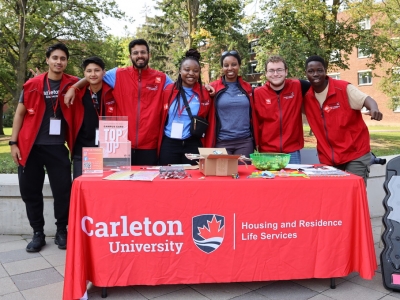The Social Sciences and Humanities Research Council (SSHRC) has awarded Partnership Development Grants to Carleton University’s Doris Buss, Department of Law and Legal Studies, and Blair Rutherford, Department of Sociology and Anthropology. The funding amounts to nearly $200,000 and will be distributed over three years.
“Carleton researchers are making a global impact with their leadership and innovation,” said Rafik Goubran, vice-president (Research and International). “We are extremely grateful for SSHRC and our global partners for their support and collaboration.”
Ensuring that women benefit equally to men from the mining of high value minerals, like gold, is a problem in African countries that are harnessing mineral resources to improve development.
“There is a real push to ensure women’s equality is being included in a number of policy areas, including mining,” said Buss. “This is an important development because mining, somewhat counterintuitively, has important impacts on women. The problem is that while there seems to be some political will to ensure new laws on mining include and benefit women, there isn’t a lot of clarity about how to do this. This is where our project comes in.”
Artisanal and small-scale mining (ASM), employs an estimated 10 million people in Africa; 40 to 50 per cent are women.
“We are excited to draw on partners in Canadian and African universities, African civil society organizations and multilateral organizations for our research on gender and artisanal gold mining in Kenya, Sierra Leone and Mozambique,” said Rutherford. “This is a great opportunity to mobilize our research in ways that support initiatives concerning mining and gender in sub-Saharan Africa.”
This project aims to deliver training adapted to the specific needs of those who are engaged in developing policies on gender and resource governance.
Buss and Rutherford have been collaboratively researching women’s livelihoods in artisanal and small-scale mining in a number of African countries, gathering data on women’s activities in ASM, as well as the gendered organization of mining and resource governance in sub-Saharan Africa.
These research results are emerging at the same time that policy-makers are developing interventions to regulate ASM, increase its economic potential and address environmental, labour and social problems. Despite the significant role of women in artisanal mining, efforts to regulate the sector in sub-Saharan Africa appear to be designed without consideration of the impact on women’s economic roles.
Media Contact
Steven Reid
Media Relations Officer
Carleton University
613-520-2600, ext. 8718
613-265-6613
Steven_Reid3@Carleton.ca
Carleton Flipboard account: https://flipboard.com/@carletonstories/carleton-stories-0gbu905my
Follow us on Twitter: www.twitter.com/Cunewsroom
Need an expert? Go to: www.carleton.ca/newsroom/experts
Monday, June 11, 2018 in News Releases
Share: Twitter, Facebook



